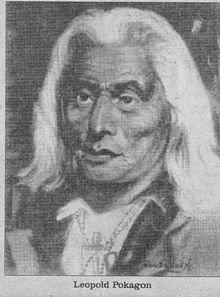Leopold Pokagon
| Leopold Pokagon | |
|---|---|
 |
|
| Born | 1775 United States |
| Died | 1841 (aged 65–66) United States |
| Nationality | Potawatomi |
| Occupation | Native American chief |
| Title | Chief |
Leopold Pokagon (c. 1775 - 1841) was a Potawatomi Wkema (leader). Taking over from Topinbee, who died in 1826, Pokagon became the head of the Potawatomi of the Saint Joseph River Valley in Michigan, a band that later took his name.
Pokagon's early life is surrounded by legend, and many details are known only in the oral histories of the tribe. Stories suggest that he was born an Odawa or Ojibwe, but was raised from a young age by the Potawatomi. His name, Pokagon, poké-igan, means "the rib," but literally means "something used to shield". As the ribs shield the heart, so too did Pokagon shield his people.
Pokagon converted to the Roman Catholic Church.
Pokagon emerged as a very successful tribal leader after 1825. In the last decade of his life, Pokagon sought to protect and promote the unique position of the Potawatomi communities living in the St. Joseph River Valley. He traveled to Detroit in July 1830, where he visited Father Gabriel Richard to request the services of a "black robe" (makatékonéya, literally "dressed in black," referring to the black robe (cassock) traditionally worn by priests). He believed that affiliation with the Catholic Church represented an important political alliance in the struggle to avoid removal. That same year, Pokagon and his wife Elizabeth were baptized by Father Frederick Rese, the vicar general of the Detroit Diocese, along with numerous fellow band members. In August 1830, Father Stephen Badin arrived to establish a mission to serve the Pokagon Potawatomi. By converting to Catholicism, the Potawatomi of the St. Joseph River Valley affirmed a new identity as the Pokagon Band of Potawatomi.
In 1833, Pokagon negotiated an amendment to the Treaty of Chicago (1833) that allowed Pokagon's Band to remain on the land of their ancestors in Michigan. Nearly all the rest of the Potawatomi were to be moved west of the Mississippi River by the federal government following the Indian Removal Act of 1830. By abstaining from alcohol at the treaty negotiations held in Chicago in 1833, and emphasizing his and his followers' conversion to Catholicism, Pokagon secured a special provision in the 1833 Treaty. Later the Pokagon Band removed to L'arbre Croche (Waaganaakising, land of the crooked tree, literally where the crooked tree is). Pokagon ultimately used the monies paid pursuant to the Treaty to purchase lands for his people in Silver Creek Township, near Dowagiac, Michigan. He patented the land in his name and becoming a private land owner same as the surrounding settlers.
...
Wikipedia
